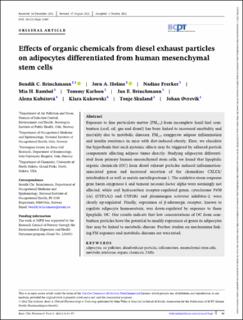Effects of organic chemicals from diesel exhaust particles on adipocytes differentiated from human mesenchymal stem cells
Brinchmann, Bendik Christian; Holme, Jørn Andreas; Frerker, Nadine; Rambøl, Mia H.; Karlsen, Tommy Aleksander; Brinchmann, Jan E.; Kubátová, Alena; Kukowski, Klara; Skuland, Tonje Schwach; Øvrevik, Johan
Peer reviewed, Journal article
Published version
Permanent lenke
https://hdl.handle.net/11250/3065761Utgivelsesdato
2022Metadata
Vis full innførselSamlinger
- Artikler [5068]
- Publikasjoner fra CRIStin FHI [7544]
Sammendrag
Exposure to fine particulate matter (PM2.5) from incomplete fossil fuel combustion (coal, oil, gas and diesel) has been linked to increased morbidity and mortality due to metabolic diseases. PM2.5 exaggerate adipose inflammation and insulin resistance in mice with diet-induced obesity. Here, we elucidate the hypothesis that such systemic effects may be triggered by adhered particle components affecting adipose tissue directly. Studying adipocytes differentiated from primary human mesenchymal stem cells, we found that lipophilic organic chemicals (OC) from diesel exhaust particles induced inflammation-associated genes and increased secretion of the chemokine CXLC8/interleukin-8 as well as matrix metalloprotease 1. The oxidative stress response gene haem oxygenase-1 and tumour necrosis factor alpha were seemingly not affected, while aryl hydrocarbon receptor-regulated genes, cytochrome P450 1A1 (CYP1A1) and CYP1B1 and plasminogen activator inhibitor-2, were clearly up-regulated. Finally, expression of β-adrenergic receptor, known to regulate adipocyte homoeostasis, was down-regulated by exposure to these lipophilic OC. Our results indicate that low concentrations of OC from combustion particles have the potential to modify expression of genes in adipocytes that may be linked to metabolic disease. Further studies on mechanisms linking PM exposure and metabolic diseases are warranted.
